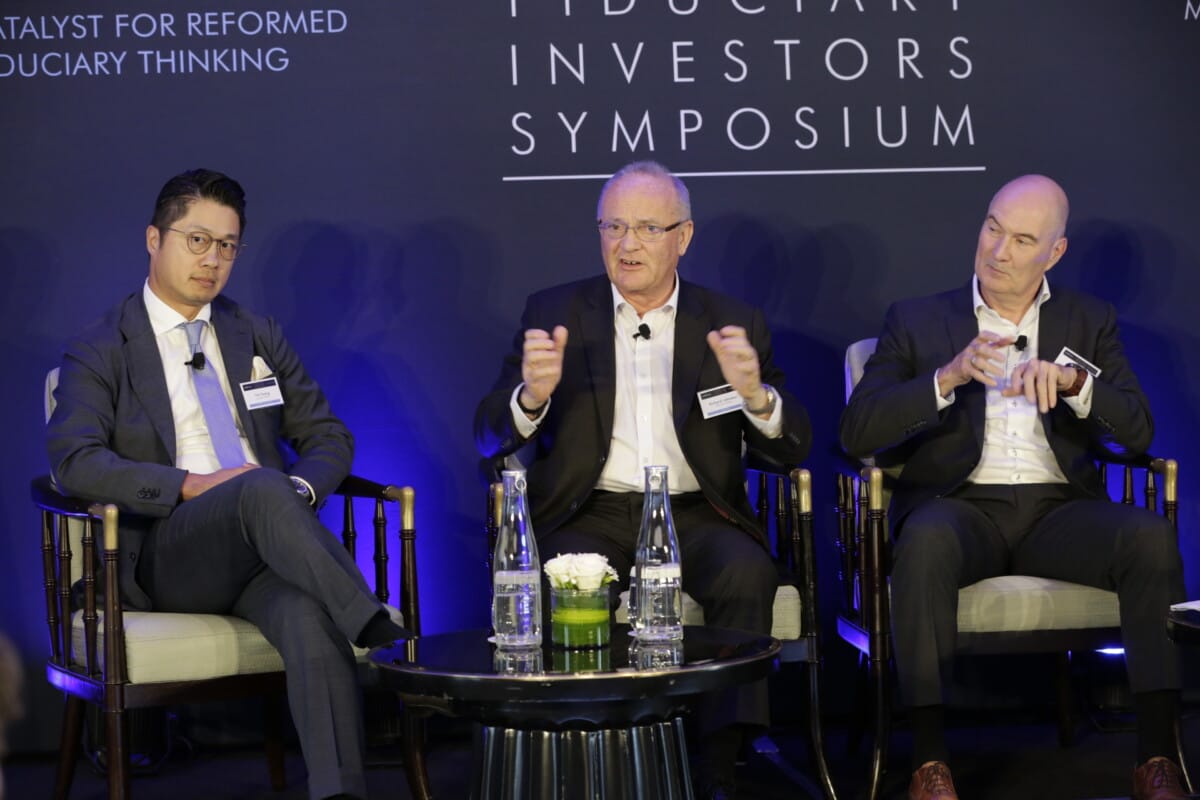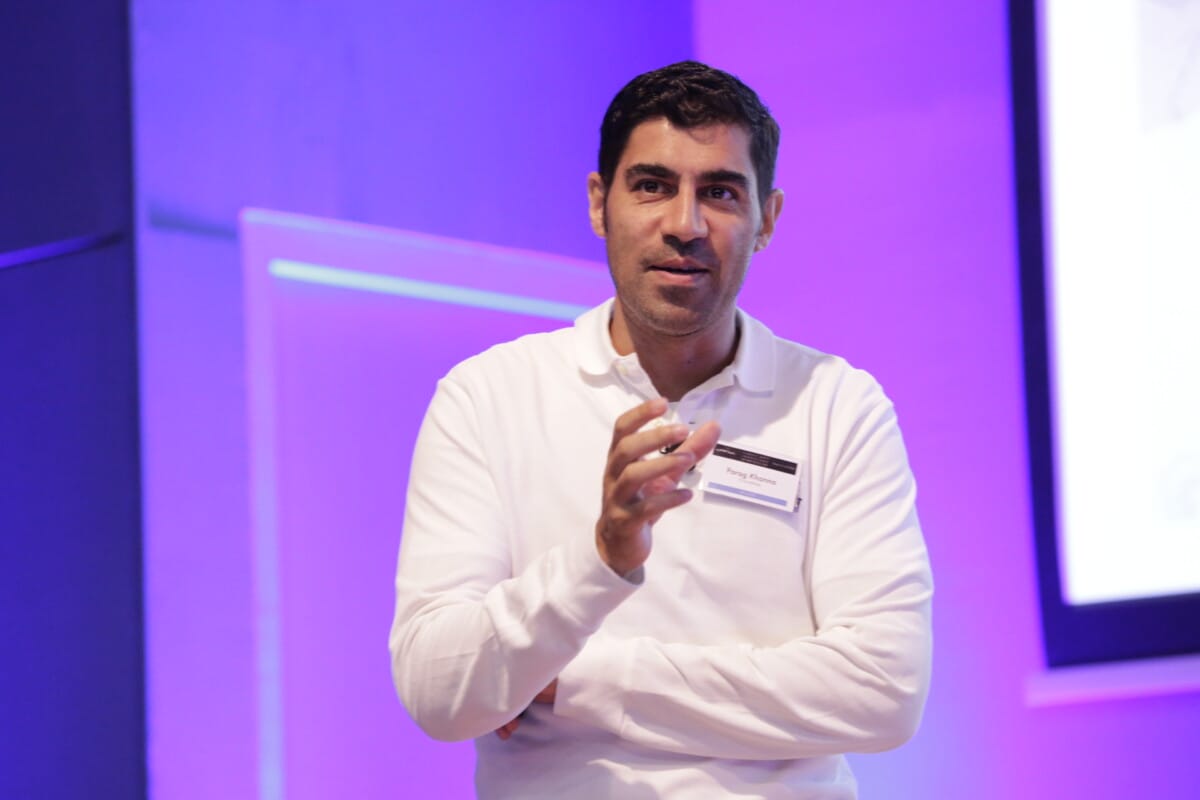Looking at economic fundamentals, rather than market cap, means investors should have up to 50 per cent of their portfolios in Asia, according to chief executive of Asia for APG, Thijs Aaten, speaking on a panel of investors at the Fiduciary Investors Symposium.
“I am a fundamentals guy, so fundamentally what is going on? I think the centre of gravity in the global economy is shifting towards Asia,” Aaten said.
“I think next year or the year after, more than half of global GDP will be coming out of the region; and 70 to 80 per cent of global growth is in Asia, whereas 70 per cent of market cap is based in the US. We invest for the long term; we think in quarters of centuries.
“The US has 4 per cent of the global population and 40 per cent of the global budgetary deficit, to fund that requires 60 per cent of global savings. I’m not so sure that is sustainable on our horizons.”
Aaten, who has been based in Hong Kong for six years, told delegates that the optimal allocation to fundamentally align a portfolio with the level of economic activity globally would require increasing the allocation to Asia.
“You should increase your allocation maybe to up to 50 per cent [to Asia], being slightly provocative on that idea,” he said.
“Ultimately pensions are paid on returns.
“In Asia we will see two billion people rising to middle-income level and that will need infrastructure, housing, logistics etc.”
Aaten pointed to investments in Indonesia, which has the world’s fourth-largest population, as a great example.
“We invested in toll roads in Indonesia that connects people in remote areas and brings economic prosperity,” he said. “One of the obstacles is not enough market cap in Asia but that’s why we like privates. If you only look at market cap in Asia, then in my view that [allocation] is far too low.”
Alpha in private markets
APG established an office in Asia in 2007 and has invested in infrastructure, private equity and some fixed income in the region since then.
“We have done close to 10 per cent over that time on an annual basis which is decent returns for the pensions we have to pay,” he said.
“Investing is about looking forward and I am quite optimistic about Asia and the opportunities that are out here in the region.
“For sure, the market is less efficient here so you should apply active management – and active management is not just about picking winners but making sure you are not buying the losers – and get out of risky assets in time because that usually helps a lot in achieving your return goals.”
Aaten and fellow panellists, Albourne Asia chair Richard Johnston and Lexington Partners partner Tim Huang, both based in Hong Kong, agreed Asia was an alpha play.
“One of the lessons in my time here is I feel like I’ve been in more bear markets than bull markets,” Johnston, who has been based in Asia for 34 years, said.
“Asia is a beta story of perpetual disappointment but has actually been an exciting alpha story. In some ways Asia deserves to be a beta story because there is still not enough discipline around the allocation of capital. You have to look at each market. In some, the government decides what margin I make there; or it’s a family, crony capitalism, not the market.”
Johnston said investors have to “dig down and look”.
“The headline indices are to be avoided, that’s what I think from my time in Asia,” he said.
“There are huge amounts of alpha at the moment. I have seen good stock pickers generate 10 per cent a year, so it doesn’t matter what beta is if alpha is so good. I am a great believer in the alpha.”
Huang, who returned to Asia in 2005 after spending his adolescent years in the US, said there is dislocation with public markets but there are certain pockets of the private markets that can generate good alpha.
“My predominant disposition is that you should be in privates because alpha can be achieved there,” he said.
Boots on the ground
All panellists agreed that having people on the ground in Asia was an important part of the story.
“We have 10 investment committee members and I’m one of the 10, so the Asian view isn’t very strong. Most sit in NYC,” Huang said.
“Being here allows for the ability to dive into the next level and have people on the ground who can peel the different levels of the onion. If we can buy risk we understand, then we can have a more intelligent conversation whether it is worth taking on that risk.”
Johnson pointed out that having people on the ground allows investors to understand the nuances of jurisdictions and structures.
“In private credit for example there are a lot of interesting solutions. There are phenomenal niches in this region, but you do need a lot of local knowledge,” he said.
He said investors are “suffering from peak American exceptionalism” and that is crowding out opportunities in other jurisdictions.
“I feel it in private credit and hedge funds,” he said.
“Investors saying I can get this in America, why would I come to anyone else in the world? But America is not without its risks going forward.”
APG has offices in both Hong Kong and Singapore and Aaten said there were many benefits in having investors on the ground.
“Half of what we are doing is private investing in infrastructure, real estate and real assets, and those are based on relationships and the network you need to build,” he said.
“We employ 90 people in Hong Kong, and 20 different nationalities. That shows [us] being tuned to the local structures of different countries. Emerging Asia is very heterogenous, not something where you can use the same model in each market.”
Aaten spoke of deals that had been negotiated in Cantonese with the documentation in English – deals that couldn’t have been negotiated and closed from APG’s Dutch headquarters.
“Being on the ground gives you a different view, seeing what is really there,” he said.
“One of the challenges in the job, is that the views and perceptions I hold are very different from what those in Amsterdam or New York might think because they are reading the papers which doesn’t always reflect what is the reality on the ground.
“That is a tough job because sometimes our views are different from the average trustee in the Netherlands who reads the newspaper and thinks that’s what is really going on.”
Aaten also argued for investing in Asia with regards to ESG considerations.
“If you want to have impact in the energy transition or climate change then think about where to have the most impact,” he said.
“Do you want to clean something that is already relatively clean like the Netherlands, or help a country leapfrog coal and go to renewables? Sixty per cent of global emissions are coming out of Asia. We are exercising our influence to help make changes.”



